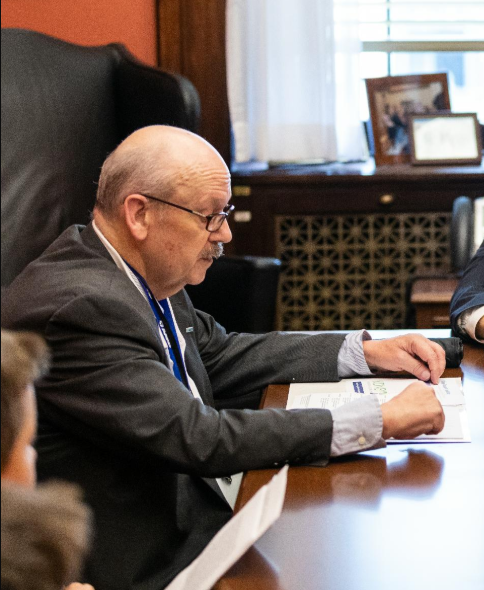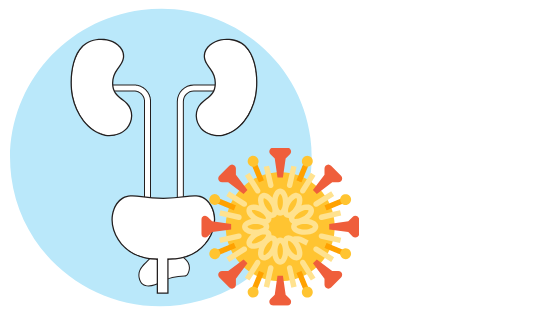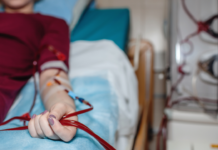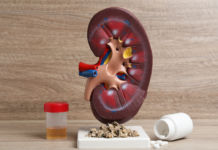Written By: James Myers
The views expressed here are those of the author and not necessarily those of The Hope or its sponsor Kibow BiotechⓇ. All information shared here is for educational purposes and does not constitute as medical advice. Always speak with you doctor before making any changes to your method of care.
Background
The Coronavirus usually causes the common cold. But not Cirus the Virus. COVID-19 or SARS-CoV-2 is a much severe disease, causing a worldwide pandemic that is rapidly affecting lives, especially those of us that have kidney disease. This blog is about exploring the effects that may have on kidney transplant patients. Currently, there are no antivirals or vaccines for the virus. Studies are ongoing.
COVID-19 SYMPTOMS
Symptoms include:
1. Fever
2. Cough
3. Shortness of Breath
4. Chills/Repeated Shaking
5. Flu-like symptoms (muscle ache, fatigue, headache, sore throat)
6. Nausea, diarrhea, abdominal pain
7. Loss of sense of smell and/or taste
8. Possibly pneumonia
According to Dr. William Goggins from Indiana University Health Kidney Transplant Center, Fever and Shortness of Breath are the main symptoms that should trigger a call to your transplant center doctor or transplant coordinator, for possible testing. Take a look at this video to better understand.
Lack of a Vaccine
Currently, as of the writing of this blog, there is no vaccine available for the Coronavirus.
Testing is Available But Limited
Currently, where I live in Lake County, Indiana testing is available, providing you have a doctor’s order. It is limited as far as locations. The availability of testing is different by regions. Check with your health care department or nearby hospitals to find out about availability near you.
Transplant Recipients Maybe at a Higher Risk for the Virus.
Currently, there is no scientific evidence that COVID-19 infections are more severe in kidney transplant recipients than healthy people. However, viruses in the past have cause a more severe version of the disease in people with kidney disease or people with low immune systems like kidney transplant recipients. Precautions need to be taken to prevent a higher rate of infection in these groups, including transplant recipients.
How is the Virus Transmitted?
Experts are certain that infect mostly occurs with direct contact with an infected person. However, recent theories have posited that the virus may be spread in the air by droplets. This is why there is a recent trend in the US of wearing masks and gloves when we go out and to maintain social distancing of at least six feet from others. Stay At Home Orders in certain states restrict travel only to essential travel, like going to the grocery or drug stores. Only essential services are open in those states.
It may also be possible to catch the virus from a surface touched by an infected person. If you touch a surface, washing your hands frequently and vigorously is recommended for 20 seconds before you touch your face, mouth or nose.
Also, people can be contagious when they have symptoms, but some people who appear non-symptimmatic may actually be carrying the virus. For this reason, many kidney transplant patients have shuttered themselves at home to avoid contact with others.
If the transplant patient is surrounded by persons who maybe infected, quarantine to a specific room maybe required to protect him.
Kidney Transplant Patients and Travel Restrictions
COVID-19 is a world-wide issue. A great place to check on the spread of the pandemic is the CDC website.
The American Society of Transplantation, makes the following recommendations on travel for kidney transplant patients:
• Follow public health recommendations for public distancing (at least 6 feet)
• Stay home as much as possible
• Avoid all unnecessary traveling, only leave home when it absolutely necessary
• The people who cohabit with kidney transplant patients, should also avoid all nonessential travel
• Avoid crowds
• Check travel restriction orders frequently as they may change. Reccommended places to check: Centers for Disease Control and Prevention (CDC); World Health Organization (WHO).
For example, in my home state of Indiana, there is a Stay At Home order in place, that is being more strenuously enforced. https://www.newsbreakapp.com/n/0Oj1zwa7?s=a1&pd=04frpavN.
• Patients and/or family members who have just returned from an area with high should avoid contact with family members & the public (quarantine) for 14 days after their return. If after 14 days, the individual remains healthy, he/she can resume contact. If he/she shows symptoms during that period, health care authorities should be contacted. If the transplant recipient shows symptoms, they should contact their transplant facility immediately.
• If avoiding contact is impossible, experts recommend
1. Frequently handwashing or hand sanitizer use
2. All householders avoid touching their face, eyes, nose and mouth
3. Limited contact with that family member as much as possible, maintaining social distancing
4. Cough and sneeze into your elbow or into a tissue, which is immediately disposed
• Transplant recipients should wear a mask or cloth covering in public, especially where social distancing is difficult to maintain. Better yet, to avoid public places to the extent possible. Cloth facemasks are recommended over surgical masks or N-95 respirators. The key is the mask should be tight-fitting, so it serves to prevent you from touching your nose and mouth. Check out the CDC’s Video on how to make your own facemask.
Actions Transplant Recipients Should Take if They Are Running a Fever or Coughing and Sneezing
• Call your transplant center, you may need a doctor’s order to obtain a test
• Put a mask on if you go out in public
• Avoid public places if possible
• Exercise good handwashing skills
• If you have flu-like symptoms or respiratory symptoms (fever, cough, shortness of breath, upset stomach ), call your transplant center immediately, avoid public places and put on a surgical mask. Even if you have mild symptoms, contact your transplant center first before going to a hospital or clinic.
Actions to be Taken if a Family Member , Co-Worker or other Close Contact is Diagnosed or Suspected of having COVID-19
• Call your transplant center immediately, make sure you tell your transplant coordinator that you had contact with some diagnosed or suspected of having COVID-19. Particularly if you have a fever, cough or shortness of breath
• Monitor yourself for symptoms
• Avoid any further contact with that person
How Do I Get Tested for COVID-19?
• Call your transplant center first, as you may need a doctor’s order to be tested
• Follow their instructions
Should I keep my Hospital Appointments?
• All of my doctors have canceled face to face appointments in favor of telemedicine appointments or rescheduling of appointments at a later date
• My kidney transplant doctor also pushed back my blood draws to every 4 months from every month
• Check with your transplant center for their instructions, particularly if you are newly transplanted, please remember that I am 4 years out from transplant. My instructions may be different than yours
What Can I Do To Prepare For An Outbreak of COVID-19 Where I Live?
• Check your local news for public health information
• Contact you local health department
• Always check with your transplant center
• Avoid crowded areas
• Avoid sick persons
• Frequently wash your hands, disinfect area that are frequently touched like door handles, counters, smartphones and tv remotes
• Make sure you have at least 2 weeks to 90 days worth of medicine and supplies on hand at all time. Avoid running out or rationing of your anti-rejection medication
• Have your medications mailed or delivered to your home, if that is not possible consider a pharmacy drive through or having a caregiver pick up your meds.
If I am waiting for a Kidney Transplant, Should I Worry About Getting the Coronavirus from my Donor?
• The risk of getting the virus from a donor is very low. Donors are screened for COVID-19 symptoms and asked about exposure history and travel.
• Organ Procurement Organizations are testing most potential donors for COVID-19.
• The issue comes into play when Donors have been to high-risk areas or have been exposed to someone diagnosed with the virus or a person being checked for the infection. That person may be asked to postpone a donation for 14 to 28 days.
• Living donors have been asked not to travel to high risk areas and to self- quarantine for 14 days before donation. During this time they are requested to monitor for symptoms of the Coronavirus.
How do I handle Situations Where my Community is Reopening or Changing Stay at Home Orders
• If you’re requested to return to work where you will be close to others, you may wish to have a medical examination and discuss with your transplant team the possible risks of exposure.
• It has been reccommended that you request a reassignment at work to a lower personal contact location.
• Practice social distancing as much as possible, continue to wear face coverings and protect yourself whenever possible to minimize the risk.
Where do I go to get Updated Information About the Virus?
• The CDC
• WHO
Sponsored By: Kibow BiotechⓇ 
About The Author: Jim Myers

My advocate nickname is Uncle Jim. If you have a kidney question or issue you need help with, please do not hesitate to contact me at kidneystories@hotmail.com. I thank the NKF for all the opportunities they have given to me.
References
1. Coronavirus Disease 2019 (COVID-19): Frequently Asked Questions From Transplant Candidates and Recipients, https://www. myast.org/coronavirus-disease-2019-covid-19-frequently-asked-questions-transplant-candidates-recipients
2. https://www.pennmedicine.org/updates/blogs/transplant-update/2020/march/info-on-coronavirus-for-transplant-patients
3. https://www.kidneyfund.org/kidney-today/coronavirus-and-kidney-patients.html
4. https://www.kidneyfund.org/coronavirus/ (April 3rd, 2020)
5. https://www.kidney.org/coronavirus/transplant-coronavirus
6. https://youtu.be/RLoFQbf52cw




